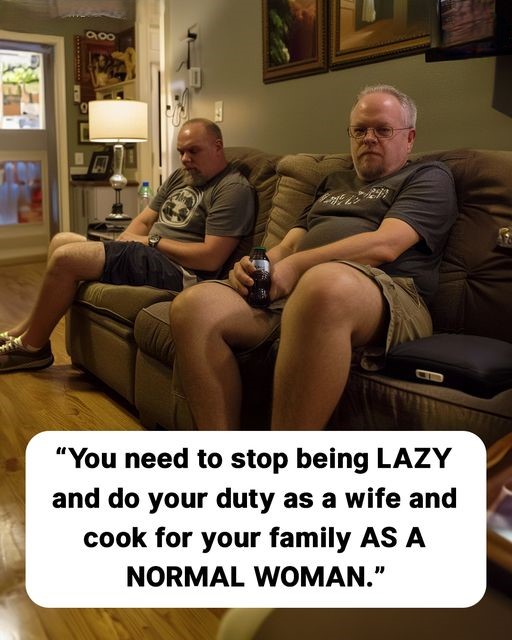My Husband Left Me and the Kids Hungry Because His Dad Believes ‘It’s a Woman’s Job to Cook’ – They Both Learned Their Lesson…

What started as a typical evening quickly escalated into a heated confrontation over outdated gender roles, forcing my children and me to go without dinner. My husband, Marcus, and his father clashed with our modern family dynamics, but they were in for a lesson they wouldn’t soon forget.
Marcus comes from a very traditional family, where his father was the sole provider and his mother stayed at home. But our family operates very differently. Marcus and I both work full-time, and we share responsibilities at home. My father-in-law despised this arrangement. He made it clear that he disapproved of me working and hated that Marcus helped with household chores.
Before they came to stay with us for two weeks, I had always had mixed feelings about my in-laws. My mother-in-law was quiet and reserved, rarely voicing her opinions, especially around her domineering husband. Though she was kind to me, her silence spoke volumes, making it clear that she didn’t entirely approve of how we ran our household. My father-in-law, however, was never shy about sharing his disdain. He frequently made snide remarks about a woman’s place being in the home, believing that men should be the head of the household and the sole breadwinners.
I tried to brush off his comments for the sake of maintaining peace. After all, I believed we could respect each other’s differences. But I knew that having them stay with us would be challenging.
Our routine worked well—Marcus and I balanced our responsibilities. I made breakfast, we all ate lunch out, and Marcus usually handled dinner. But one evening, after I came home from work exhausted, I went upstairs for a quick shower. I expected to come downstairs to a prepared meal, as was our usual routine. But when I returned, there was nothing—no dinner on the table, no sign of cooking.
The kids were hungry and kept asking when we’d eat. I looked at Marcus, but he wouldn’t even meet my eyes. That’s when his father spoke up, “Sarah, your husband didn’t cook anything because it’s not his job. You need to stop being lazy and do your duty as a wife. A normal woman would have dinner on the table by now.”
I was stunned. My husband just sat there, nodding along with his father’s outdated beliefs, avoiding eye contact. I was furious. Both of them needed a wake-up call.
“Really?” I said, my voice shaking with anger. “So after working a full day, I’m supposed to come home and start cooking, because that’s my duty as a wife?”
My father-in-law scoffed. “That’s right. A woman’s place is in the kitchen.”
I turned to Marcus. “And you agree with this?” I asked.
He shrugged and mumbled, “It wouldn’t hurt if you took better care of the house and kids. Tradition is tradition.”
“Tradition?” I snapped. “Tradition isn’t going to pay the bills when you make $35,000 a year. We’re a family of five, Marcus, and your salary isn’t enough to support us. You’re too broke to be this sexist.”
Tears welled up in his eyes, but I wasn’t done. I turned to his father. “And you! When was the last time you took your wife out for dinner? Do you even know how much it costs to run this household?”
Pointing to the car he drove, I continued, “That car you’re so proud of? I paid for it. Your son asked me to cover the payments because my income is bigger than his. So, since I’ve already covered this month’s car payment, I’ll use the money to take your wife and my kids out for dinner instead. Let’s see how you two figure out the next payment—like real men.”
Without waiting for a response, I gathered my mother-in-law and the kids and headed to a nice restaurant. We enjoyed a wonderful meal, and my mother-in-law, for the first time, seemed relaxed and grateful, thanking me multiple times throughout the evening.
Back at home, I knew Marcus and his father were left to stew in their discomfort. They needed to understand that respect and partnership are what make a family work—not outdated traditions.
The next morning, the tension was palpable. Marcus and his father were unusually quiet during breakfast. Finally, Marcus broke the silence. “I’m sorry,” he said quietly, his voice barely above a whisper. “I let my father’s views influence me, and I realize now how much I hurt you.”
His father shifted uncomfortably but eventually spoke up as well. “I’m sorry, too. I’ve always believed in certain ways of doing things, but I see now that times have changed.”
My mother-in-law, sitting quietly, nodded in agreement. While I appreciated their apologies, I needed to see real change.
Over the next few days, both men made noticeable efforts. Marcus resumed his usual duties without complaint, and his father, though clearly uncomfortable at first, tried to help out where he could.
One evening, as we prepared dinner together, my father-in-law approached me. “Thank you,” he said sincerely. “You opened my eyes. I see now that respect and partnership are what truly matter in a family.”
His words touched me. “I’m glad you understand,” I replied. “It’s not about being right or wrong—it’s about supporting each other.”
From that moment on, things improved. Marcus and his father worked together to ensure that everyone felt valued and respected, and my mother-in-law began speaking up more, voicing her thoughts and needs. Our family grew closer, breaking free from outdated traditions that no longer served us.
In the end, it wasn’t just about teaching them a lesson—it was about growing together and building a stronger family built on mutual respect.